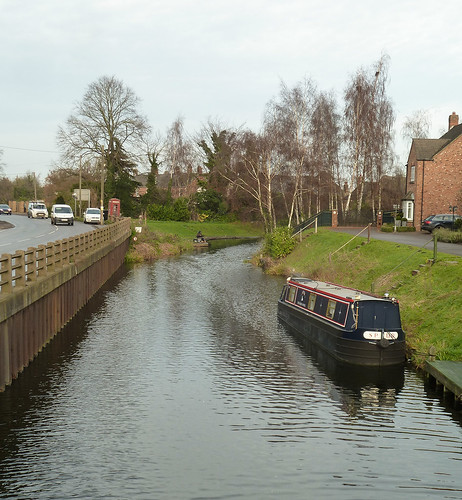
OK, this isn't a classic 3/4 view of a canal boat, but it's interesting all the same.
For a start, look at how the boat sits tail-down on the water. The engine is presumably the heaviest part, or has the owner just tied it to the bank tighter at the stern? I've never seen this modelled before, model boats on canals sit flat.
The canal is quite modelable too. This shot is from the bridge at Outwell village, home to the Wisbeech and Upwell tramway, or at least it was.
6 comments:
Those photos look like just the sort of stuff you could see on a modelmaking competition - a converted (or replica) narrow boat somewhere on a canal - and a village name sign (itself quite possibly photographed near a canal).
However, what is this we see - a picture of a handheld toy tram engine, PhotoShopped into the centre of said sign? THIS WILL NEVER DO!!!
I mean, whatever next? Before we know it, someone will be sticking crocheted trees on a layout next.
After all, as we ALL know, prototype fidelity is key - and NOBODY is EVER allowed anything resembling a sense of humour ... .
No - of course not - but I'm guessing that anyone judging a model building competition needs to be seen to be deadly serious about always striving for the highest standards of prototype fidelity.
Same goes for anyone expecting to be taken seriously as a MMR.
No - I don't want anyone to imagine that I'm out to take cheap shots at anyone - and certainly not a judge on Channel 5's Great Model Railway Challenge - who appears to have recently been on the receiving end of a load of unwarranted flak - accused of marking down some novelty items on a layout.
I could also add that I met - and spoke to - both the GMRC judges at the 2018 Warley show - and they both come across as thoroughly decent people.
I hope we get to see and hear more from both these people, in another series of GMRC next year.
Anyway, returning to your photos, how that canal boat sits in the water is very interesting. A number of former working boats would have been designed to sit low - and flat - in the water - when loaded with tons of payload (perhaps coal, or grain).
They weren't designed to sit flat with just a few items of lightweight mobile home fittings and a few people to use them.
In fact, not all working boats were even designed to have a Diesel engine at one end, with nothing heavy at the other end to balance the weight out. That's right - a number of real working boats were "butty" boats, intended to be pulled or pushed along, whilst packed with a heavy payload - rather different from any current use as houseboats, or for leisure purposes.
The historic view of that scene is well captured in model form by Alan Price and Neil Rushby on their Outwell basin layout.
Different canal boats sit differently in the water, as can the same one under different circumstances. Too high at the front and they can become difficult to handle in wind. How full fuel, water and "pump-out" tanks are can all make a difference to the trim. On one Leeds and Liverpool trip our boat had both pump-out tanks on the same side, and when full it took on an unpleasant list.
This is because the engine is right in the stern, together with the fuel tanks and the heating system. If the boat has been prepared for over-wintering then the fuel tanks will be full to reduce condensation, and the freshwater tanks right in the bow will have been drained. Hence the stern-down attitude.
Actually Graham, perhaps Phil should suggest his version of the sign to the parish council there. At least the TTTE connection is relevant to the area with the Rev Awdry having been a local clergyman for part of his life, as, indeed was Teddy Boston.
Interesting points about "over wintering" - none of which should really come as a surprise to anyone.
To be honest, I'd never given stuff like that any thought - mainly because I've never spent much time in boats.
Just out of curiousity, would boat owners be likely to also put tarpaulins or boards over the top? I don't know, as I don't tend to spend a lot of time too near open stretches of canals during the winter.
Huw, probably not, you want ventilation in a boat, not to trap moisture inside it. This is also a time for maintenance, and a canal drydock could make a nice feature on a layout. A friend who lives aboard a narrowboat all year recently mentioned how weathered the side away from the bank became.
Post a Comment